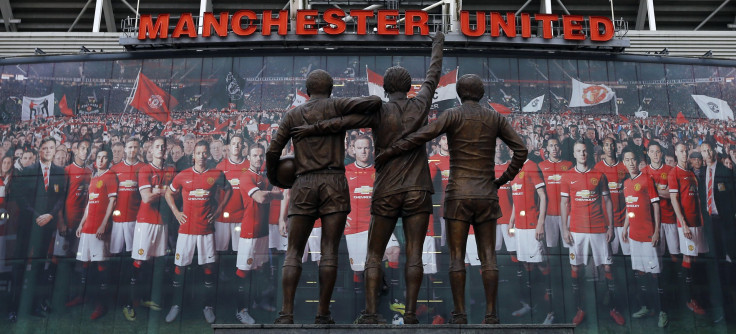Manchester United News: Profits Plunge Predicted; Could Transfers Of Falcao, Di María Boost Premier League Hopes In 2014-2015?

Manchester United (NYSE: MANU) announced record revenues and adjusted earnings, but cautioned that both figures were set to fall in the coming year as the Premier League club counts the costs of last season’s on-the-pitch failures. Revenues for the 2013-14 financial year rose by 19 percent to £433.2 million ($698.7 million). Although its profit took an 83.7 percent dive from £146.4 million ($236.1 million) in 2013 to £23.8 million ($38.4 million) this year, it can be largely attributed to a large tax credit the previous year, without which United would have made a loss. The adjusted Ebitda was a record £130.1 million ($210 million).
The bump in revenues for the club, which is majority owned by the American Glazer family, are thanks to an increase in commercial and broadcasting income. Commercial revenue rose by 24.1 percent to £189.4 million ($305.7 million) on the back of several new sponsorship partnerships. Manchester United shirts have been branded with the Chevrolet logo for the first time this season on the back of a $559 million deal struck with General Motors, and next year’s accounts should be boosted by a record £750 million ($1.2 billion) kit sponsorship deal recently inked with Adidas. The club has also benefited from the continued pulling power of the English Premier League, both at home and internationally, with the competition’s new TV deals helping to boost United’s broadcasting revenues by 33.7 percent.
“We are very proud of the results achieved in fiscal year 2014 as we once again generated record revenues and Ebitda driven by our commercial and broadcasting businesses which delivered impressive year over year growth,” said Manchester United’s executive vice-chairman Ed Woodward in the report.
Behind the positive headline figure, there is reason for concern, however. The club expects revenues to fall to between £385 million ($621.4 million) and £395 million ($637.6 million) next year, while adjusted Ebitda, which was £130.1 million ($210 million pounds) this year, is forecast to be drop to between just £90 million ($145.3 million)and £95 million ($153.3 million). Following the departure of legendary manager Sir Alex Ferguson, Manchester United fell from first to seventh in the Premier League standings, a failing that led to the dismissal of Ferguson’s replacement David Moyes, after less than 10 months in charge. The club’s accounts reveal that it paid £5.2 million ($8.4 million) in compensation payments to Moyes and members of his coaching staff.
That figure, though, is just the start of the costs of Manchester United’s worst season on the pitch since 1990, which explain the pessimistic forecast for revenues and profits next year. Crucially, the club failed to qualify for the lucrative Champions League, from which it received €44.8 million ($57.9 million) in prize money alone last season. Further money would also have been made in match-day revenue from the extra games at the club’s home stadium, Old Trafford. Instead, Manchester United did not even make it into European soccer’s secondary competition, the Europa League, which, as an example, garnered fellow Premier League club Tottenham Hotspur €5.9 million ($7.6 million) last season.
The failure to get into the world’s premier club competition will also impact future sponsorship agreements and, indeed, current ones. It has been revealed that Adidas’s deal contains a clause that means it will pay 30 percent less if United are out of the Champions League for two or more consecutive seasons, beginning in 2015-2016.
It is easy to see why, then, the club has spent heavily to bolster its playing squad in recent months. Employee benefit expenses rose 19 percent to £214.8 million ($345 million) this year on the back of the signings of Marouane Fellaini, Juan Mata, Ander Herrera and Luke Shaw. The quartet arrived for combined fees of £121.6 million ($196.3 million), helping to push the amortization of players’ registrations up 32.6 percent.
And amortization is set to rise to £100 million, ($161.4 million) in next year’s accounts, according to the Financial Times, after Manchester United continued its spending since the arrival of Dutch manager Louis van Gaal. Marcos Rojo, Daley Blind and, for a club-record £59.7 million ($96.4 million) transfer fee, Ángel di María arrived last month. Colombian striker Radamel Falcao also joined on an expensive loan deal, reportedly with the prospect of costing £43.5 million ($70.2 million) to make the arrangement permanent next summer.
“With Louis van Gaal at the helm as Manager, and the recent signing of some of the world’s leading players to further strengthen our squad, we are very excited about the future and believe it's the start of a new chapter in the Club’s history,” Woodward said in his commentary. “Louis’ footballing philosophy fits very well with Manchester United and he has an impressive track record of success throughout his career, winning league titles with every club he has managed.”
The transfer expenditure is a rapid departure from the days of Ferguson, though, when the focus was on developing home-grown talent and spending smaller fees on promising players rather than established stars. But, especially after Van Gaal’s reign started in even more disappointing fashion than his predecessor’s, the Glazers, hugely criticized by many United supporters for their debt-laden takeover and parsimonious stewardship, have decided that investment on the pitch was needed to avoid a continuing hit to profits off it.
© Copyright IBTimes 2024. All rights reserved.





















